Subscribe now to get notified about IU Jharkhand journal updates!
Influence of Spiritual Intelligence on Stress Handling Capability of Senior Professionals
Abstract :
With increasing responsibilities and accountability for senior working professionals due to continuously escalating business demands, enhanced stress handling capabilities are expected out of them. Focusing on this aspect, recent research studies indicate spiritual intelligence being one of the key factors to be leveraged upon to cope up with ever increasing stress levels amongst senior working professionals and deliver to the best of their abilities as well as management’s expectation.With several research studies related to spiritual intelligence and stress been carried out in past, dedicated study on the three key components of spiritual intelligence namely Connection to Self, Connection to Others and Connection to Transcendent, their influence on each other and on Stress is rare.
The present study attempted to examine the influence of Spiritual Intelligence on Stress Handling Capability of senior working professionals from various industries and disciplines. The total of 82 participants completed the questionnaire on Self-Assessment Spiritual Intelligence at Work, and The Workplace Stress Scale Copyright © The Martin Company, North Haven, CT, and the American Institute of Stress, Yonkers, NY, a scale measuring eight major factors associated with levels of stress in a Workplace environment.
The findings suggested that there were significant positive correlations amongst the three components of Spiritual intelligence, along with significant negative correlation between Connection to Self and level of Stress. Results showed that by increasing Connection to Self, Stress levels can decrease. The findings of the study are relevant since it indicates a significant relationship and influence of Spiritual intelligence in managing the occupational stress levels of Senior Professionals.
Keywords :
Spiritual Intelligence, Stress, Connection to self, Connection to others, Connection to transcendent, professionals1. Introduction
For decades the entire concept of intelligence was restricted to Intelligence Quotient (IQ), with introduction of another dimension of intelligence namely emotional intelligence, with Emotional Quotient (EQ) as its measure cropping up during the early 90’s. With IQ focusing on information processing and EQ concerned with managing emotions, EQ was deemed higher than IQ. Over a period of time there has been a shift from IQ to EQ and resting at Spiritual intelligence/Spiritual Quotient (SQ). Spiritual intelligence deals with the ‘intelligence of meaning’ and our existential nature as a human being. Significant negative correlations were reflected between CTS & Stress and CTT & Stress for senior professionals with high level of CTT. The results suggest that senior professionals with high level of CTT are able to better manage their stress levels.Hence, null hypothesis Ho4 is also not accepted.
Danah Zohar (1997)[1]coined the term “Spiritual intelligence” as it related to our deeper Self and answering fundamental questions on existence, values and meaning of life. Spiritual Intelligence allows an individual to gain insight over his or her Spiritual Quotient allowing h to harness our potential to the best to have higher level of satisfaction from life. A wide range of benefits can be reaped from spiritual intelligence, which can’t be restricted to mere curbing workplace corruption at the workplace. It contributes towards good leadership (Zohar, 2005) [2], job satisfaction (Jeloudar &Goodarzi, 2012) [3] integrating the qualities of flexibility and emotional resilience (Noble, 2001) [4], proper behaviour (Zohar & Marshall, 2000) [5] and the list is endless.
However even after several studies, evidence reflects for non-clarity about the absolute definition of spirituality or associated benefits of it at a workplace (Rhodes, 2006) [6].
Neal (2004) [7] proposed the three major components of Spiritual intelligence namely Connection to self, Connection to others and Connection to Transcendent.
Stress in general leads to negative effect for the organization as well as individual employee (Kumar, C. S., 2011) [8]. There are lists of sources which can be categorized as organizational stressors (Bhatti, et. al., 2010) [9] along with another list accounted to personal finances and family expectation asextra-organizational stressors (Lasky, 1995) [10].There are numerous researches which list down the various sources of stress for any professional, with Workload being one of the most common sources and the list is endless (Wilkes, 2015; Al-Aameri, 2003) [11] [12].
A vital aspect that needed an answer was how an individual with a high spiritual intelligence reacts while dealing with situations of stress? And is there a significant influence of Spiritual Intelligence on stress handling capacity of Professionals working at senior level management?
Objective of the study
The current study aimed to explore for any significant relationship amongst the levels of spiritual intelligence, its 3 components of Spiritual intelligence namely Connection to Self, Connection to Others, Connection to Transcendent and the level of Stress amongst the senior working professionals.
Literature Review
A series of research work have been carried out since then with findings relating spiritual intelligence focusing upon aspects like:
• Adaptability for problem solving and goal achievement (Emmons, 2000) [13]
• Awareness & Learning from all experiences from life as a whole (Noble ,2000)[14]
• Understanding the world and own position in that (Buzan, 2001)[15]
• Intelligence of Self and Soul (Zohar & Marshall, 2001)[5]
• Behaving with compassion, practicality and calm mind even in adverse situations (Wigglesworth, 2006)[17]
• Better management of situations (Tirri, 2006)[18]
• Enhanced adaptability and strong mental stability (Grecian & Shear, 2006)[19]
• Better understanding of work and workplace reality (Dutta et al., 2013)[20]
Connection to Self (CTS), the first and most important component of spiritual intelligence, signifies that individuals having strong connection to self are more connected to their values and beliefs, possess high degree of emotional quotient levels, and spiritually developed to calmly analyse themselves and have control over their thoughts, feeling and behaviours(Neal, 2004) [7].
Connection to Others (CTO) was more concerned with the relationship an individual is having with other individuals at workplace, friend circle and society in general. This has got significance when it’s a matter of working in groups, teams and even acceptability, leading and getting work done through others (Neal, 2004) [7].
Connection to Transcendent, is all about connection of an individual with greater than self, can be stated to as God, almighty, supreme power of universe etc. Individuals who reflect high “Connection to Transcendent” has a clarity about the purpose of their life and stay connected with ethical aspects and dimensions of life like justice and respect. (Neal, 2004) [7].
Stress has become an inevitable part of modern professional’s life. With rising levels of frustration, burn-out and increasing number of stressors, it is portraying further challenges in front of senior management to perform and deliver much beyond their capabilities. Beehr and Newman (1978) [21] speak for stress as a hindrance disallowing an individual to act best as in normal state. Senior management professionals might be encountering role stress leading to adverse or negative results (Kahn and Quinn, 1970) [22]. And it’s not that a senior management professional would have stress only due to his workplace assignments, they too have a set of expectations to fulfil from their families (Sarantakos, 1996) [23] and home-life (Alexandros-Stamatios G.A et al., 2003) [24].
There are researches who speak for a strong influence of spiritual intelligence on coping and avoiding situations of stress and depression (Khosravi &Nikmanesh 2014; Mahboobeh et al., 2019; Pena, 2010; safavi et al., 2019) [25] [26] [27] [28]. However, specific empirical evidence regarding Spiritual intelligence with its components, Connection to self, Connection to others and Connection to Transcendent having any influence on Stress levels of senior professionals was still to be explored.
Research Methodology
A Sample of 82 senior professionals across industries was considered. The data was collected using established Neal scale of spiritual intelligence and work place stress by Martin Company.
Cronbach’s alpha technique was adopted for analysing the reliability of the data. Any mean score of Connection to Self, Connection to Others, Connection to Transcendent and stress was considered to be extremely high for score of 4 or more and high for a score of 3 or more (Raw scores were divided by number of variables under all these to arrive at mean score).
Before analysing the data, a normality test was carried out using Shapiro-Wilk test, followed by a series of Pearson’s correlation test for exploring significant relationships, if any. SPSS, version 20 was used for carrying out the tests.
Hypothesis
H01: There is no significant relationship between connection to self (CTS), connection to others (CTO), connection to Transcendent (CTT) with the overall score of Spiritual intelligence(SI)amongst senior working professionals.
H02: There is no significant influence of high and very high level of CTS on CTO, CTT, SI and stress level amongst senior working professionals.
H03: There is no significant influence of high and very high level of CTO on CTS, CTT, SI and stress level amongst senior working professionals.
H04: There is no significant influence of high and very high level of CTT on CTS, CTO, SI and stress level amongst senior working professionals.
Analysis, Findings and Discussions
WithLillefor’s sig. Value less than 0.05, the data set was found to be non-normal as per Shapiro-Wilk, confining analysis to non-parametric tests.
Reliability test of Cronbach’ Alpha were carried out on the data set for questionnaires used for Spiritual Intelligence (30 Statements), Work place stress (8 Statements) and both combined as total data set (38 Statements). All the data sets were found to be reliable with a Cronbach’s Alpha value > 0.70 depicted in Table1, Table 2 and Table 3 respectively.
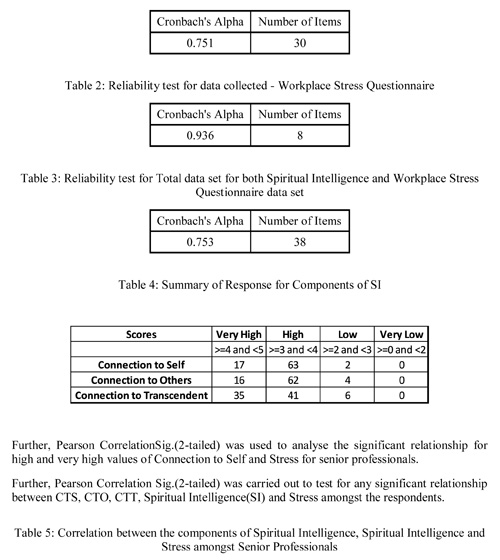
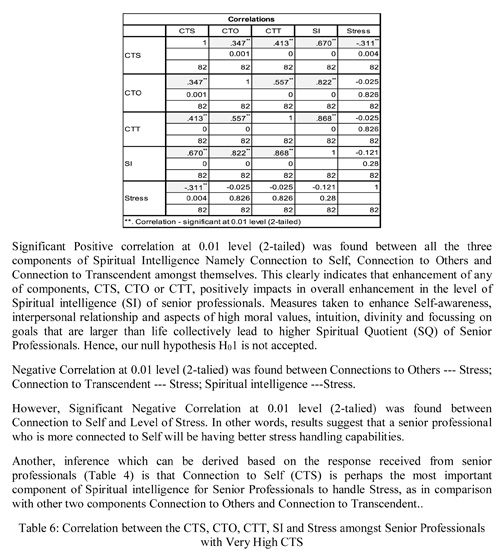
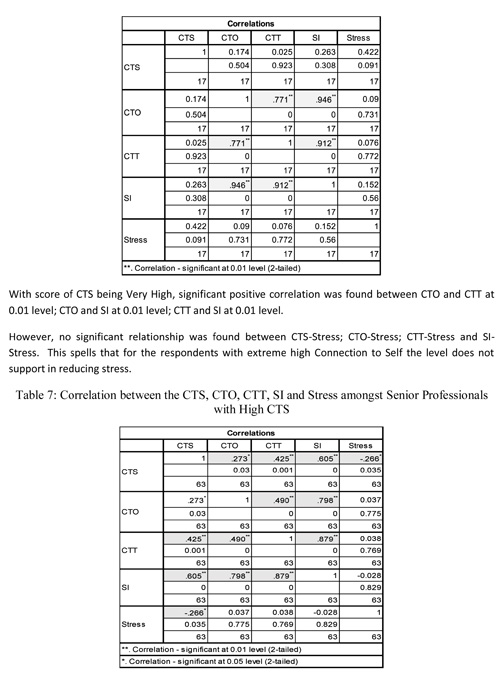
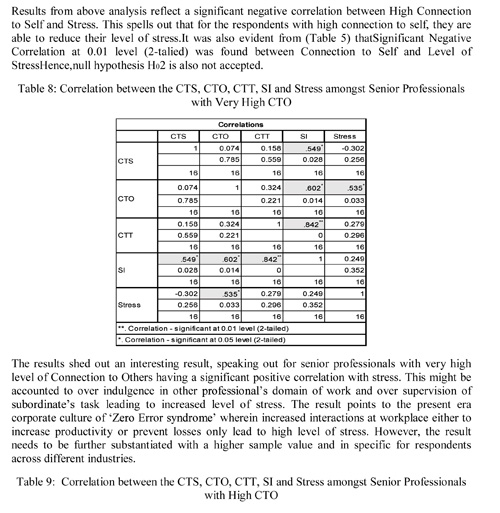
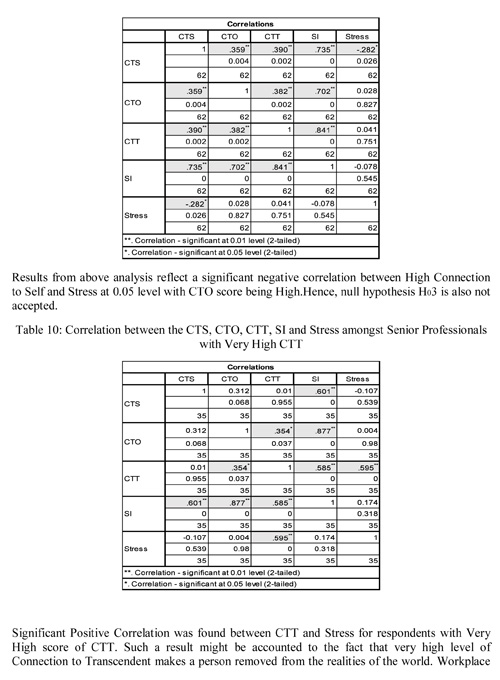
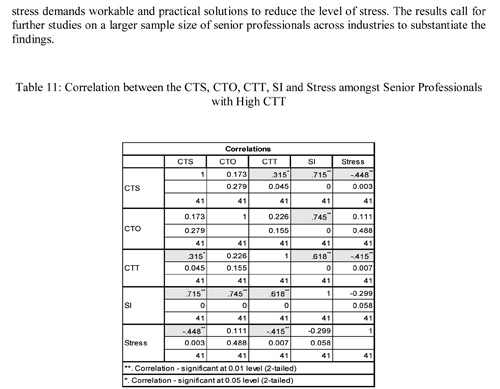
Conclusion
The analysis of the results suggests significant positive correlation between the components of spiritual intelligence, CTS, CTO&CTT and their relationship with the overall scores obtained on the Spiritual intelligence scale which speaks for a significant positive influence of the three components of Spiritual intelligence on each other and overall Spiritual Intelligence.
It can also be safely concluded that level of Spiritual intelligence is having a significant influence in reducing stress and enhancing stress handling capabilities for senior professionals, being supported by past research findings (Zohar & Marshall, 2000).
It can also be concluded that senior professionals who display very high level of CTS, CTO and CTT do not have any significant influence in reduction stress. However, at the same time it can safely be concluded that display of high level of CTS and CTT do have a significant influence in reduction of stress levels amongst them.
Limitations and Scope for Future Research
The study was carried out on a relatively not very large sample size and respondents were belonging to various industries.
Research Studies can further be carried out in specific to influence of Connection to others and Stress handling capability amongst senior professionals and in general considering the three components of SI in specific sectors and industries for different levels of management.
